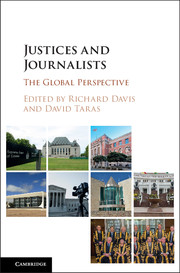Book contents
- Frontmatter
- Contents
- List of Contributors
- Acknowledgements
- Introduction: Judges and Journalists and the Spaces In Between
- 1 Judicial Communication: (Re)Constructing Legitimacy in Argentina
- 2 Communication beyond the Judgments: The Australian High Court, Speaking for Itself, but Not Tweeting
- 3 Uncommon Transparency: The Supreme Court, Media Relations, and Public Opinion in Brazil
- 4 The “Uncomfortable Embrace”: The Supreme Court and the Media in Canada
- 5 Germany: The Federal Constitutional Court and the Media
- 6 The Supreme Court and Media in Ghana's Fourth Republic: An Analysis of Rulings and Interactions between Two Estates of the Realm
- 7 The Puzzle of Judicial Communication in Indonesia: The Media, the Court, and the Chief Justice
- 8 Carping, Criticizing, and Circumventing: Judges, the Supreme Court, and the Media in Israel
- 9 Judicial Communication in South Korea: Moving toward a More Open System?
- 10 Changing the Channel: Broadcasting Deliberations in the Mexican Supreme Court
- 11 Norway: Managed Openness and Transparency
- 12 Judicial Institutional Change and Court Communication Innovations: The Case of the UK Supreme Court
- 13 Symbiosis: The US Supreme Court and the Journalists Who Cover It
- Conclusion
- Index
- References
9 - Judicial Communication in South Korea: Moving toward a More Open System?
Published online by Cambridge University Press: 16 February 2017
- Frontmatter
- Contents
- List of Contributors
- Acknowledgements
- Introduction: Judges and Journalists and the Spaces In Between
- 1 Judicial Communication: (Re)Constructing Legitimacy in Argentina
- 2 Communication beyond the Judgments: The Australian High Court, Speaking for Itself, but Not Tweeting
- 3 Uncommon Transparency: The Supreme Court, Media Relations, and Public Opinion in Brazil
- 4 The “Uncomfortable Embrace”: The Supreme Court and the Media in Canada
- 5 Germany: The Federal Constitutional Court and the Media
- 6 The Supreme Court and Media in Ghana's Fourth Republic: An Analysis of Rulings and Interactions between Two Estates of the Realm
- 7 The Puzzle of Judicial Communication in Indonesia: The Media, the Court, and the Chief Justice
- 8 Carping, Criticizing, and Circumventing: Judges, the Supreme Court, and the Media in Israel
- 9 Judicial Communication in South Korea: Moving toward a More Open System?
- 10 Changing the Channel: Broadcasting Deliberations in the Mexican Supreme Court
- 11 Norway: Managed Openness and Transparency
- 12 Judicial Institutional Change and Court Communication Innovations: The Case of the UK Supreme Court
- 13 Symbiosis: The US Supreme Court and the Journalists Who Cover It
- Conclusion
- Index
- References
Summary
South Korea is widely accepted as a showcase of two miracles: economic prosperity and political liberalization. This “impossible country” in Asia has moved from being an economic wasteland in the 1960s to being an economically wealthy and politically vibrant nation in the 2010s (Tudor 2012). The steady evolution of Korea into a functioning democracy is remarkable, given that Koreans were ruled by a series of strong-arm authoritarian governments in the 1960s through the mid 1980s (Breen 2004, 196–220).
Korea is rated as “free” by Freedom House, a democracy advocacy organization in Washington, D.C. The nation's news media are able to report on government policies and corporate wrongdoing with few external constraints (Freedom House). Free speech and a free press in Korea have significantly contributed to consolidation of a rule-of-law system in Korea in recent years (Youm 1994).
The judiciary, too, has seen democratic gains. Before the “people power” revolution in Korea in the mid 1980s, entrenched judicial practices were oppressive. In this predemocracy era of Korea, the unwritten code of conduct for Korean judges was to err on the side of limiting their communication to their judicial writings. In other words, Korean courts and judges were discouraged from directly interacting with the press beyond their court opinions. Now, the judiciary is much more open.
In fact, the Supreme Court of Korea (SCK) and the Constitutional Court of Korea (CCK) have been making a concerted effort to address a lingering distrust of the courts via a commitment to open communication with the public. “The Korean Judiciary will invite the public to see the courts,” SCK Chief Justice Sung-tae Yang stated in 2014. “We will open our minds and make the courts transparent to obtain people's understanding. We will exert our best to continuously reach out to the people and thus realize the true spirit of the law” (Yang 2014, 7). Likewise, CCK President Han-Chul Park (2014) hopes that his court web page will be “a wide open forum” to offer CCK information to the public and to receive opinions from the public.
- Type
- Chapter
- Information
- Justices and JournalistsThe Global Perspective, pp. 184 - 208Publisher: Cambridge University PressPrint publication year: 2017
References
- 3
- Cited by



